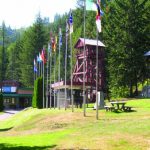EDITORIAL: Out Of Bounds Outlaws
With the number of avalanche fatalities in the news over the past several weeks, and the volume of media coverage the incidents have received, many British Columbians and Canadians in general have been asking questions about the overall safety of backcountry travel, be it skiing, snowmobiling or other.
While avalanche activity is normal in BC, and unfortunately deaths do happen, the particularly unstable and dangerous snowpack this season, combined with the frequency of avalanche deaths over the past couple of weeks, has opened up the debate on whether or not legal sanctions should be imposed on backcountry travelers. In particular travel emanating from ski areas into the nearby “Slackcountry” has been debated.
Piquing my own interest in the subject was this week’s case – of the four skiers at Grouse Mountain who although skied out unharmed, were banned for life and will be responsible for the costs associated with their rescue incurred by the ski area. At first thought, it all seemed a little backwards to be charging skiers for a rescue that appeared to be unnecessary, and to be banning them for life for skiing outside of the ski area’s controlled boundary. Looking into the matter further, however, I discovered that Grouse is an exception to the norm in BC.
Most ski areas in BC are largely located in and are surrounded by Crown land. Grouse is situated on private land, and also surrounded by private land. This is an important distinction in this case; while travelling on public land is perfectly within all of our rights, regardless of the obvious dangers, the fact that Grouse is on private land gives the resort a stronger hand in withholding skiers’ rights to travel out of bounds and the ability to charge and ban them from the resort.
Also in this case the skiers involved were unremorseful about the danger they posed not to themselves but the rescuers who may have also had to travel into harm’s way. Although it sounds harsh to charge skiers who appeared to not need a rescue for a rescue operation, Grouse was simply acting based on experience in a pre-emptive matter. Had the situation turned out poorly for the skiers and had Grouse not acted, the question of why didn’t they act would have been equally omnipresent in the media.
This incident, however, calls into question whether or not British Columbia (where, unlike in the United States–Colorado in particular, for a closer comparison—we enjoy an open boundary policy at our resorts) should be revisited and whether or not legal sanctions should be imposed to punish skiers for exiting a ski area’s boundaries to ski or travel in the backcountry. In Colorado just last week three skiers were arrested under state legislation barring such actions.
Grouse Mountain, which employs a zero tolerance policy regardless of skier education or training for leaving the ski areas boundaries, is pushing the re-visitation of open boundary policies.
“We believe that the measures we already have should provide a deterrent (to going outside the controlled recreation area) if personal responsibility is not enough of a deterrent already,” explained Grouse Mountain’s public relations manager William Mbaho. “We also understand that these measures prove to be ineffective at improving the prevention of blatant boundary transgressions and maybe it’s time that we as a community seek to introduce legislative repercussions that are enforceable by our government.”
Speaking with BC’s new Solicitor General, John Van Dongen, this week after listening to a CBC radio interview with him in which he trail-ballooned the possibility of enacting regulations on leaving ski area boundaries, he noted that the government is looking into whether or not legal sanctions against skiers in that situation is an issue worth pursuing.
“I’m not sure that I characterized it as a trial balloon, but you know you get confronted by these issues and questions, and as a minister trying to reflect the public interest I was simply indicating I’m asking myself and asking stakeholders and the public whether or not some kind of a fine or penalty or some similar consequence is necessary.”
“Right now if someone knowingly goes out of bounds and goes into restricted areas, we don’t have anything like that. Sometimes people argue that people should have to pay for the cost of search and rescue. I’m not sure that’s appropriate because it will serve as a significant disincentive for people to ask for help, but we’re trying to consider whether or not what with all of the education we do, (the province works with the Canadian Avalanche Center and works through our provincial emergency program and we partner with local search and rescue teams and support them.) I’m simply asking the question, is something like this helpful, would it be effective, would it be good public policy? The first line is always that people need to take personal responsibility and look at all of the scientific advice that we put out there, and when ski area operators establish restricted areas I find it discouraging and disheartening that some people will just totally ignore that. So that’s the concern. I don’t have a hard and fast opinion on this matter, and am open to the public’s thoughts as well as stakeholders’ on the issue.”
The thought of regressing BC ski areas’ open boundaries policies to making it illegal to exit the controlled recreation boundaries of ski resorts is a scary if not reactionary approach in my opinion and walks a very fine line between personal freedoms, and regulation intended to keep people safe. The thought of potential border patrols on ski area boundaries, while unrealistic, also seems to go against the nature of free travel on public lands and the enjoyment of the great and natural backcountry for those who are educated enough to do so safely in appropriate conditions.
While, yes, it is true that many people are undereducated on the hazards of backcountry travel, and many more who think they are educated are likely not sufficiently so, it seems a backwards approach to consider imposing fines and legal sanctions for venturing out from a ski area.
Aside from being nearly impossible without an astronomical amount of resources for enforcement, does it not make more sense to focus new energy and resources into bolstering education programs, avalanche safety courses, and funnelling more money into the Canadian Avalanche Association to increase the frequency of bulletins to better make people aware of the hazards and educate them on avoidance and safe travel in the backcountry rather than punishing those who choose to ski beyond the ropes?
Jimmy Spencer, President of the Canada West Ski Areas Association is also of the belief that education, first and foremost, is the best approach to the situation.
“I don’t think you can ever make it illegal. I mean it is Crown land, it is public land, and I don’t think we ever want to say you can’t go there. The thing you can say is, look , out there the conditions are extremely dangerous, the snowpack is extremely hazardous, the strongest advice we can give you is do not go beyond the controlled recreational boundary because you are putting yourself in danger and you may lose your life. I don’t think we can ever go the other route of, ‘no you cannot go in there it is forbidden’. That simply cannot work under the current law.”
“I don’t think it’s ever been the intent of the ski industry to close boundaries. If it’s Crown land you certainly have access to it, what we can do, though, is say this is the end of the controlled area, beyond this point the snowpack is dangerous: don’t go there. But it needs to be suggested, not ordered.”
In speaking with a number of people on this issue, I found in general that the people who think it should be illegal to travel into the backcountry from a ski resort also tended to be people who are unfamiliar with, and are not actively involved in the backcountry skiing world. While I will agree 100% that a large part of the skiing population does not have the proper equipment, knowledge, skills or awareness to travel outside of the ropes, I will disagree 100% of the time that the answer to keeping people safe in a potentially dangerous situation is barring everyone from legally accessing that terrain.
To put that argument into a different context, I think about just how many people get lost or get into trouble in the ocean for various reasons, but you don’t see people asking that it become illegal to allow people into the water. To that extent, the notion that imposing fines on people for ducking ropes will deter people from venturing out of bounds in my mind is a losing argument. If the threat of potentially losing your life is not enough of a deterrent to keep unskilled people out of the backcountry, than I hardly believe a monetary fine will accomplish that goal.
If, as it seems, we are unable to control people’s actions, and allowing that regardless of legal sanctions there will always be a small group of people who will defy whatever laws are put in place to their own detriment, I repeat the question: would it not make more sense to increase resources into backcountry safety education, rather than simply banning the activity?
It would appear that the recent rash of incidents around BC has heightened the public’s awareness of the dangers that exist in uncontrolled snowy mountainous environments. Let’s capitalize on that energy while it exists and lobby the Solicitor General and other government and funding agencies to increase funding to the Canadian Avalanche Association. Let’s increase conditions reporting, increase the awareness and availability of avalanche safety courses and the likes, and do more to impress upon skiers the potential hazards of backcountry skiing and what it takes to reduce and mitigate those risks.
That, I believe, is the true solution to this problem, if there is one. Locking up the boundaries and financially punishing and banning skiers who wish to travel into the backcountry won’t solve anything.
Let us know your thoughts in this week’s poll.






















